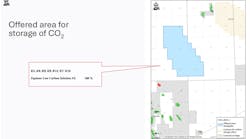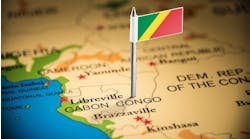Angolan delays in deepwater awards
The change of government in Angola, from strict MPLA party rule to a government of national unity incorporating rival UNITA has led to delays in finalizing negotiations for new leases in Angola's much coveted deepwater area. And this delay stands in bold relief in the entire oil industry, because Angola's deepwater region has so far proved the most prospective of all regions in the Gulf of Guinea. Which is why there was more than a putter of applause when Texaco won the award for the keenly contested Block 22. This award should pave the way for the long waited award of leases 23, 24 & 25 and the protracted negotiation with Mobil on Block 19.World's largest 3D survey over Angola's 17 & 18
Amoco has completed the World's largest 3D seismic survey, all of 6,800 sq km in deepwater offshore Angola. The survey carpets the entire 5,000 sq km lease, and extends beyond it by more than a third, to Blocks 17 (Elf), 19 (in negotiation with Mobil), and 5 (Open). The first well is planned for first half 1998. Amoco has a contract with Falcon Drilling for four wells in the second half of 1998. Falcon plans to convert the salvage vessel Deepsea Worker to a drillship. Amoco shares a 50-50 partnership with Shell in Block 18, but it is the operator of the lease.Exxon to drill second Amoco Block 15 well
Exxon is expected to be drilling the second well in Block 15 now, with the semi sub Ocean Valiant. There is no word on the first well, which was supposed to be spudded with the Peregrine III. Exxon planned to drill three wells. The company completed 885 sq km of a 3D seismic survey in April.Equatorial Guinea may have pay in its East Luba
Did CMS Nomeco encounter significant oil pay in East Luba-1? If they did, the hydrocarbon profile of that small island country would change considerably. So far, the report on this well has been on tight status. The most revealing information is that 2D STs were run, which is indicative of oil zones being tested for their deliverability. East Luba-1, located in Boiko Island, is particularly significant when it is considered that Equatorial Guinea has not reported any commercial oil pay outside of its share of the Niger Delta Basin, which lies mainly in Nigeria to the north. So far, the only productive sequences in Equatorial Guinea are the sands which belong within the Qua Iboe shale, a stratagraphic sequence that is well documented in the Mobil concessions offshore Nigeria. East Luba-1 was drilled to 13,862 ft measured depth. Another well, Riaba-1 was spudded in June.Nigeria field development delayed
Just before Ashland ran into a problem with the Nigerian government, which resulted in the latter revoking the former's licenses in Nigeria, the company had just completed Okwori South-4, in preparatory for putting the field on stream. Okwori South, located in OPL 90, in 150 meters offshore Niger Delta, was planned to produce 20,000 b/d oil, a figure which would have doubled Ashland's production in Nigeria. But the Nigerian petroleum minister cancelled Ashland's licenses accusing the company of selling its interests in Nigeria without consulting the ministry.Conoco gearing up in Nigeria's productive Block OML 108
After two years of relatively benign activity, Conoco Energy is smarting again in Nigeria. Last June, the US company started production of the small Ukpokiti Field (OML 108), located downdip of Chevron's prolific offshore field Meren. Conoco has 40% interest in the lease, with 57.5% belonging to the indigenous company Express Petroleum, which is the operator and leaseholder.Conoco has spent all the money so far, being the technical partner and financier. Ukpokiti Field was developed using a low-cost fit-for-purpose capital and operating cost approach. Field development included three remote caisson-type structures, five wells (with multiple completions), and the conversion of the Conoco VLCC tanker Independence into a floating production and storage offtake vessel (FPSO). Facilities for processing the three-phase, produced-fluid stream and for water injection are located on the FPSO. The vessel, with a 1.7 million-barrel storage capacity, also serves as an export terminal. Peak production of 20,000 b/d oil was expected to be reached by the end of July following completion of well tie-ins and the commissioning of a water injection system.
Meanwhile, Conoco starts drilling the first of two deepwater wells this September, in OPL 220, adjacent to Shell's OPL 219. The rig on call is the Transocean Driller. A third well in the same lease is planned for February 1998. When Conoco first came to Nigeria five years ago, it moved swiftly to become the most active new entrant, forming technical partnerships with a slew of the indigenous companies and drilling a total of nine wells-on their behalf - in three years. But most of the results were disappointing. Only four of the nine wells encountered oil and even the successful wells proved up only marginal fields.
Implications of the new French policy
After decades of running French-speaking Africa from Paris, as if it were still the colonial master there, France is going to cut back on the number of its troops in the region and is taking a fresh look at how it doles out money to old cronies who rule in France's interests, according to reports, citing officials of the new Socialist-led government. The prime mover for change, the report says, is the new prime minister, Lionel Jospin, who has criticized decades of French paternalism toward Africa as one of the main reasons why democratic development in French-speaking countries has lagged, and who has now ordered a top-to-bottom review of French policy in Africa.What does this mean for France's own investment in the oil industry along the Gulf of Guinea, where the French oil giant Elf Aquitaine runs the oil patch especially in Gabon and Cameroon? Only last April, Gabon's president Omar Bongo was widely reported to have warned Elf, operator of one-third of the country's 350,000 b/d oil output, that it might lose out relative to US rivals after a Paris magistrate froze President Bongo's French bank account.
Copyright 1997 Oil & Gas Journal. All Rights Reserved.


